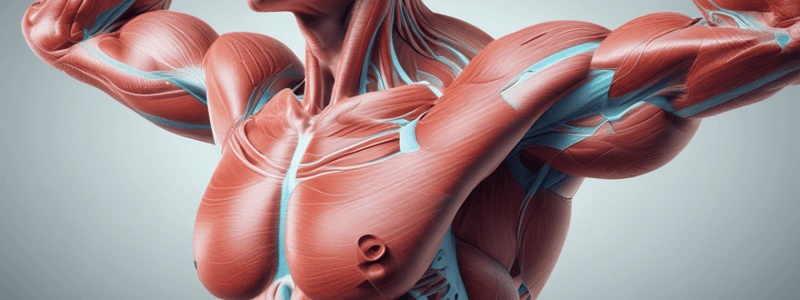Podcast
Questions and Answers
A vector is a quantity that is completely specified by its magnitude and its direction.
A vector is a quantity that is completely specified by its magnitude and its direction.
True (A)
The point of application of the muscle force is where the muscle intersects with the bone.
The point of application of the muscle force is where the muscle intersects with the bone.
False (B)
The angle-of-insertion describes the angle formed between a muscle and a tendon.
The angle-of-insertion describes the angle formed between a muscle and a tendon.
False (B)
When a force acts without a moment arm, it can only translate a body segment.
When a force acts without a moment arm, it can only translate a body segment.
The product of a force and its moment arm produces a torque.
The product of a force and its moment arm produces a torque.
The internal torque is defined as the product of the external force and its moment arm.
The internal torque is defined as the product of the external force and its moment arm.
3rd Class Levers always have a mechanical advantage greater than 1.
3rd Class Levers always have a mechanical advantage greater than 1.
Muscles can only serve a mobility function but not a stability function.
Muscles can only serve a mobility function but not a stability function.
Human body contains approximately 200 skeletal muscles.
Human body contains approximately 200 skeletal muscles.
Skeletal muscles only produce force for locomotion and breathing purposes.
Skeletal muscles only produce force for locomotion and breathing purposes.
When a joint is in a close-packed position, the stability role of the muscles increases.
When a joint is in a close-packed position, the stability role of the muscles increases.
Muscle forces can only have rotatory components and not translatory components.
Muscle forces can only have rotatory components and not translatory components.
Muscles produce greater force during eccentric activation than during concentric activation.
Muscles produce greater force during eccentric activation than during concentric activation.
An isometric contraction can develop greater tension than a concentric contraction.
An isometric contraction can develop greater tension than a concentric contraction.
Tension decreases as the speed of shortening increases in a concentric contraction.
Tension decreases as the speed of shortening increases in a concentric contraction.
Tension increases as the speed of active lengthening increases in an eccentric contraction.
Tension increases as the speed of active lengthening increases in an eccentric contraction.
During an isometric contraction, the muscle lengthens slightly and the tendon shortens slightly.
During an isometric contraction, the muscle lengthens slightly and the tendon shortens slightly.
The compliance of the tendon is not important in augmenting the torque production of the muscle.
The compliance of the tendon is not important in augmenting the torque production of the muscle.
If the pennation angle is less than 0°, then all the force produced by the muscle fiber is transmitted longitudinally through the tendon.
If the pennation angle is less than 0°, then all the force produced by the muscle fiber is transmitted longitudinally through the tendon.
The contractile proteins within the sarcomeres are responsible for muscle contraction.
The contractile proteins within the sarcomeres are responsible for muscle contraction.
The network of noncontractile components in muscles includes epimysium, perimysium, and endomysium.
The network of noncontractile components in muscles includes epimysium, perimysium, and endomysium.
Parallel elastic components (PEC) and series elastic components (SEC) of muscles both contribute to force generation.
Parallel elastic components (PEC) and series elastic components (SEC) of muscles both contribute to force generation.
When a muscle lengthens, the parallel elastic components (PEC) also lengthen in parallel with the muscle fibers.
When a muscle lengthens, the parallel elastic components (PEC) also lengthen in parallel with the muscle fibers.
The slack collagen fibers within the parallel elastic component tighten when sarcomeres shorten from their resting position.
The slack collagen fibers within the parallel elastic component tighten when sarcomeres shorten from their resting position.
The size of the motor unit does not influence the order in which it is recruited by the nervous system.
The size of the motor unit does not influence the order in which it is recruited by the nervous system.
Rate coding refers to the modulation of force produced by muscle fibers based on the discharge rate of action potentials.
Rate coding refers to the modulation of force produced by muscle fibers based on the discharge rate of action potentials.
If a muscle fiber is allowed to fully relax before the subsequent action potential, the second twitch generates a weaker force compared to the first twitch.
If a muscle fiber is allowed to fully relax before the subsequent action potential, the second twitch generates a weaker force compared to the first twitch.
Muscle twitches summate and generate a lesser peak force if the next action potential arrives before the preceding twitch has relaxed.
Muscle twitches summate and generate a lesser peak force if the next action potential arrives before the preceding twitch has relaxed.
Small motor units innervate muscle fibers classified as F (for fast) with quick and powerful twitch responses.
Small motor units innervate muscle fibers classified as F (for fast) with quick and powerful twitch responses.
Soleus muscle fibers are considered relatively fatigue resistant due to their slow and oxidative histochemical profile.
Soleus muscle fibers are considered relatively fatigue resistant due to their slow and oxidative histochemical profile.
Flashcards are hidden until you start studying




